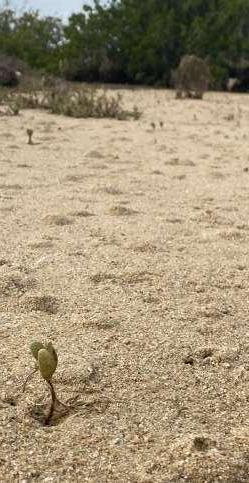
2 minute read
Wetland Conservation & Community Projects
Wetland Conservation and Community Participation
KEY ACHIEVEMENTS
Organization and facilitation of the 1st Forum for Environmental Health of Ramsar Site Laguna la Cruz
Completion of the Rapid Assessment of the Canal del Infiernillo Ramsar site
Increased leadership and capacity of community conservation groups
Increased institutional recognition for leadership in mangrove restoration and environmental protection
Natalia Blancas Gallangos collecting data about mangrove health
Participative processes with the Kino and Comcaac communities strengthened organizational and leadership capacity and resulted in the implementation of collaborative conservation projects in Ramsar sites “Laguna la Cruz” and “Canal del Infiernillo”. An environmental characterization study of Laguna la Cruz was initiated in collaboration with other academic institutions, and significant diffusion efforts increased awareness and interest in environmental issues and conservation activities in both Ramsar sites. The Wetlands Conservation Program provided valuable support for local leaders responding to a variety of environmental issues threatening the estuaries and coasts of the region. Collaborative efforts will continue to develop strategies that benefit communities and protect ecosystems.
Community Participation and Economic Alternatives
• Accompaniment and economic support for 2 community projects involving 25 community members
• Increased support for community response to environmental threats (e.g. sewage treatment and aquaculture expansion)
• Facilitation of participative dialog in local communities

Canal del Infiernillo Rapid Assessment workshop
Conservation and Management

Red mangroves in Laguna la Cruz • EnvironmentaL assessment of 4 Canal del Infiernillo estuaries
• 10 Canal del Infiernillo Rapid Assessment workshops and forums with the Comcaac communities
• Collaboration toward the designation of a municipal protected area in Laguna la Cruz
• Development of a draft tri-institutional work plan (Prescott/ DICTUS/CONANP)
• 4 clean-up campaigns
• 3 Center presentations and 4 community group presentations in the Forum for Environmental Health of Ramsar Site Laguna la Cruz • 14 meetings with the Specialized Technical Working Group for Laguna la Cruz • Initial environmental characterization of Laguna la Cruz in collaboration with the Technological Institute of the Yaqui Valley and the University of Sonora

Impact:Supporting the development of community leadership and inter-institutional collaboration leads to increased awareness and skills applied to scientific study, conservation actions, and sustainable practices in the region’s estuaries.










